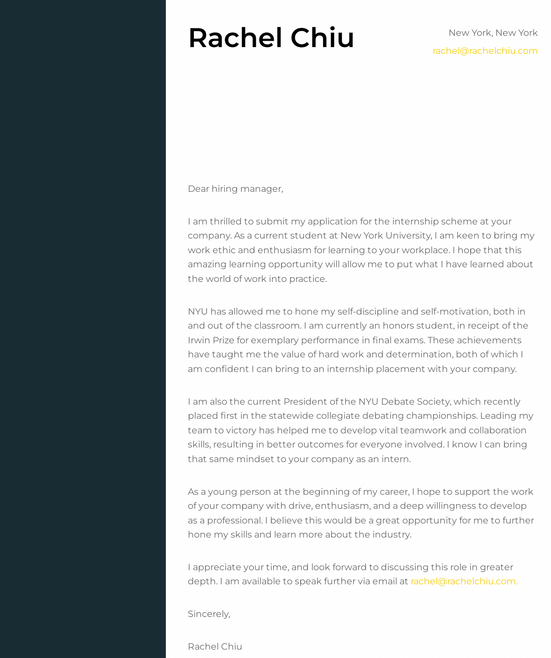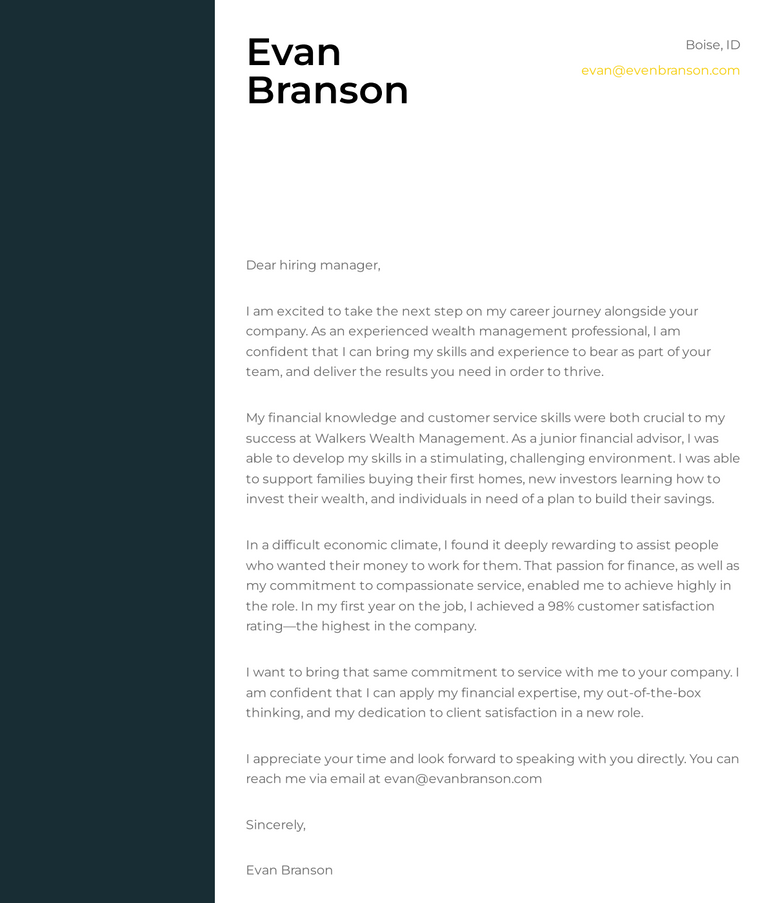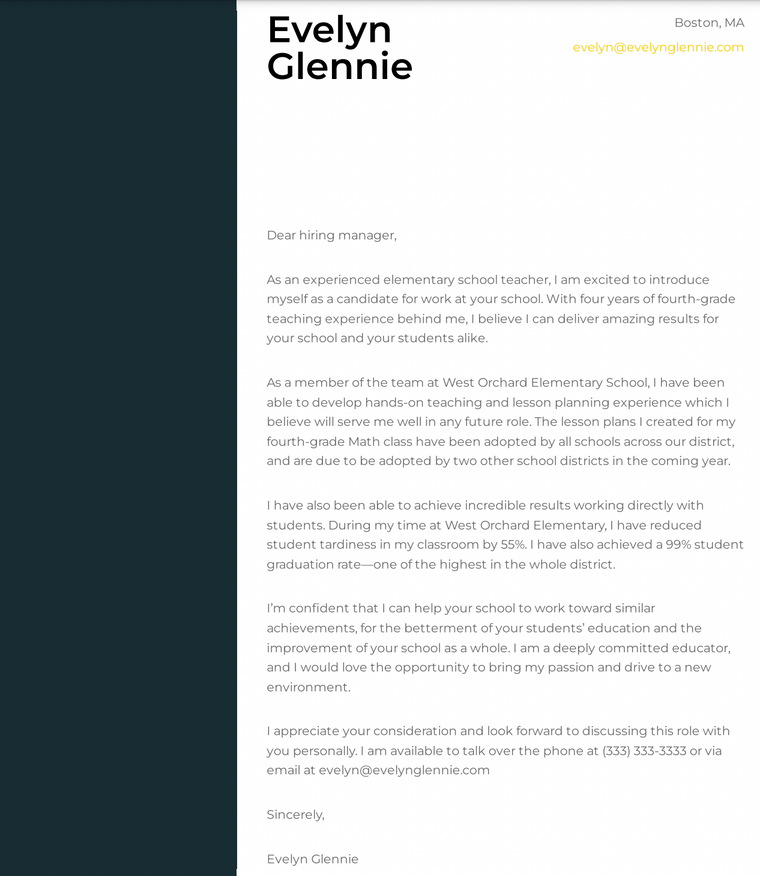Generic Cover Letter Samples and Examples for 2022
Having a good generic cover letter can give you a solid foundation for all the bespoke cover letters you send out. Learn how to create the best generic cover letter with our guide, including samples and examples!

In most situations, it’s not the best idea to apply for a job using a generic cover letter. Most hiring managers will want to see that you’re interested in working for their company in particular. If you send out a generic cover letter, you risk giving the impression that you don’t care enough about the job to customize your application.
But having a good generic cover letter can give you a solid foundation for all the bespoke cover letters you send out. You’ll be able to tweak your generic letter according to the needs of each role you apply for, instead of writing a brand new cover letter for every application you send. Getting your generic cover letter right can save you a lot of time and energy on your job search!
And it’s also worth remembering that in situations like job fairs, you may need to hand out a lot of cover letters and resumes to a lot of different companies. Obviously, that’s a situation in which you won’t be able to customize your cover letter for each job! So you’ll have a real advantage if your generic cover letter is well put together.
That’s why we’ve put together this guide to writing the best possible generic cover letter. On this page, we’ll cover the following points:
- How to write a generic cover letter
- How to address your generic cover letter
- Examples of generic cover letters tailored to situations when you may need them
How to Write a Generic Cover Letter
The idea of a generic cover letter is to cover all the same bases as a bespoke cover letter—just without any reference to a specific job or employer. This means that it should follow the same structure as a bespoke cover letter, as follows:
- Introduction
- Experience, skills and achievements
- Your vision
- Conclusion
We’ll cover each section, one at a time, so you can nail each one on your first try. Let’s get to it!
Introduction
Your introductory paragraph can be short—ideally, it shouldn’t demand more than two or three sentences. Use it to introduce yourself and state that you would like to apply for a job.
Because this is a generic cover letter, don’t worry about specifying which particular job you’d like to apply for! When you customize your generic cover letter for specific roles, you can include that information—but at this stage, it’s fine to say “I would like to be considered for a role at your company,” or something equally vague.
You can also use this section to provide a brief description of who you are and what you specialize in. Remember not to repeat your resume! The benefit of a cover letter is being able to express yourself in a more personal and extended way, so make the most of that opportunity.
Experience, Skills and Achievements
This section can encompass up to two paragraphs, and should focus on the most relevant experience, skills and achievements you have. Remember, this isn't a resume, and you don’t have to write a comprehensive list! You can be selective when writing your cover letter.
But since this is a generic cover letter, how do you decide what’s relevant? The reality is that when you personalize this generic letter, you’ll probably need to make a lot of changes to this section. The experience, skills and achievements you include should reflect the requirements of the job description, and show that you can excel in the areas where you will need to excel in the role you want.
For the time being, though, choose your most impressive qualities and include them in this section. If you have a sense of the general type of role you’re likely to apply for, you can choose experience and skills that are relevant to that area! This will give you a slight head start when it’s time to personalize your letter.
Your Vision
In a bespoke cover letter, this paragraph is your chance to stand out from the crowd. It’s a place where you can mention what you would bring to a role if you were hired—whether that’s relevant skills, past experience, useful personality traits, or a genuine passion for the work.
But in a generic cover letter, you’ll need to keep it fairly vague. Like the experience, skills and achievements section, this is an area of your letter that you will need to change for each application you make! For the purposes of your generic cover letter, though, you can talk in non-specific terms about the qualities you hope to bring to a new role.
This paragraph should flow naturally from the experience, skills and achievements section. Your letter will read more cohesively if you draw on the qualities you’ve already stated that you have! After all, those are the qualities you will be bringing to the role—so use this paragraph as a way to summarize them for the reader.
Conclusion
A conclusion might seem like one of the easiest parts of a cover letter, but don’t get complacent! Your conclusion should hold the attention of a hiring manager right to the end of your letter. Even in a generic cover letter, your conclusion should avoid generic phrasing—“I look forward to hearing from you” will lose anyone’s interest right away
A good conclusion should thank the hiring manager for their time and proactively offer them ways to contact you. That way, they’ll need to keep reading all the way to the end for the sake of that important information.
How to Address a Generic Cover Letter
Figuring out how to address a cover letter can be a real challenge if you’re not sure how to do it. And when you’re writing a generic cover letter, and you aren’t sure who will end up reading it, knowing how to address it can be an even bigger headache. So how do you address a generic cover letter?
When you’re writing a bespoke cover letter for a particular role, and you know who your contact is at the company, you should address your contact directly and by name. The job description and application instructions may tell you who to address in your cover letter, so make sure to read them carefully!
But if you’re writing a generic cover letter, you will need to take a different approach. Because your letter won’t be targeted to a particular company or hiring manager, you will need a more generic form of address. “Dear hiring manager” is a reliable choice in this situation.
We always recommend steering clear of forms of address like “To whom it may concern,” mainly because hiring managers are likely to see it as impersonal and out of date. Likewise, “Dear sir” makes some assumptions about gender that may not go down well with a hiring manager! As such, you should avoid it wherever you can.
Generic Cover Letter Examples
Still not sure where to start with your generic cover letter? We’ve prepared some generic cover letter examples for a range of relevant situations. Whether you’re providing application materials to a placement agency or asking a careers office to help you find an internship placement, we’ve got you covered.
Generic Internship Cover Letter Example
When you’re preparing to apply for internships, having a strong generic cover letter to start from can save you a lot of time! Here’s an example of a generic cover letter for an internship placement.

Dear hiring manager,
I am thrilled to submit my application for the internship scheme at your company. As a current student at New York University, I am keen to bring my work ethic and enthusiasm for learning to your workplace. I hope that this amazing learning opportunity will allow me to put what I have learned about the world of work into practice.
NYU has allowed me to hone my self-discipline and self-motivation, both in and out of the classroom. I am currently an honors student, in receipt of the Irwin Prize for exemplary performance in final exams. These achievements have taught me the value of hard work and determination, both of which I am confident I can bring to an internship placement with your company.
I am also the current President of the NYU Debate Society, which recently placed first in the statewide collegiate debating championships. Leading my team to victory has helped me to develop vital teamwork and collaboration skills, resulting in better outcomes for everyone involved. I know I can bring that same mindset to your company as an intern.
As a young person at the beginning of my career, I hope to support the work of your company with drive, enthusiasm, and a deep willingness to develop as a professional. I believe this would be a great opportunity for me to further hone my skills and learn more about the industry.
I appreciate your time, and look forward to discussing this role in greater depth. I am available to speak further via email at rachel@rachelchiu.com
Sincerely, Rachel Chiu
Generic Cover Letter for Placement Agency Example
Placement or recruitment agencies will often ask for a generic cover letter, so they can pass it on to a range of clients who might be prepared to take you on. As such, this generic cover letter example assumes a specific career background, but isn’t targeted to a particular company or role.

Dear hiring manager,
I am excited to take the next step on my career journey alongside your company. As an experienced wealth management professional, I am confident that I can bring my skills and experience to bear as part of your team, and deliver the results you need in order to thrive.
My financial knowledge and customer service skills were both crucial to my success at Walkers Wealth Management. As a junior financial advisor, I was able to develop my skills in a stimulating, challenging environment. I was able to support families buying their first homes, new investors learning how to invest their wealth, and individuals in need of a plan to build their savings.
In a difficult economic climate, I found it deeply rewarding to assist people who wanted their money to work for them. That passion for finance, as well as my commitment to compassionate service, enabled me to achieve highly in the role. In my first year on the job, I achieved a 98% customer satisfaction rating—the highest in the company.
I want to bring that same commitment to service with me to your company. I am confident that I can apply my financial expertise, my out-of-the-box thinking, and my dedication to client satisfaction in a new role.
I appreciate your time and look forward to speaking with you directly. You can reach me via email at evan@evanbranson.com
Sincerely, Evan Branson
Generic Cover Letter for Teacher Job Fair
Teacher job fairs are a common way for teaching professionals to find work—and they can involve handing out a high number of generic cover letters and resumes! To help you get ready for the next teacher job fair, we’ve put together an example cover letter for an educator in search of a new role.

Dear hiring manager,
As an experienced elementary school teacher, I am excited to introduce myself as a candidate for work at your school. With four years of fourth-grade teaching experience behind me, I believe I can deliver amazing results for your school and your students alike.
As a member of the team at West Orchard Elementary School, I have been able to develop hands-on teaching and lesson planning experience which I believe will serve me well in any future role. The lesson plans I created for my fourth-grade Math class have been adopted by all schools across our district, and are due to be adopted by two other school districts in the coming year.
I have also been able to achieve incredible results working directly with students. During my time at West Orchard Elementary, I have reduced student tardiness in my classroom by 55%. I have also achieved a 99% student graduation rate—one of the highest in the whole district.
I’m confident that I can help your school to work toward similar achievements, for the betterment of your students’ education and the improvement of your school as a whole. I am a deeply committed educator, and I would love the opportunity to bring my passion and drive to a new environment.
I appreciate your consideration and look forward to discussing this role with you personally. I am available to talk over the phone at (333) 333-3333 or via email at evelyn@evelynglennie.com
Sincerely, Evelyn Glennie
Copyright ©2025 Workstory Inc.